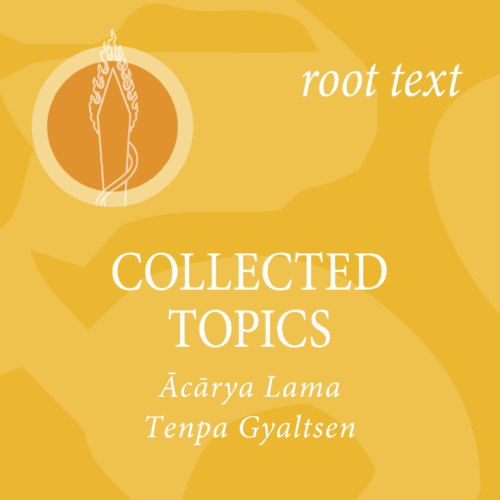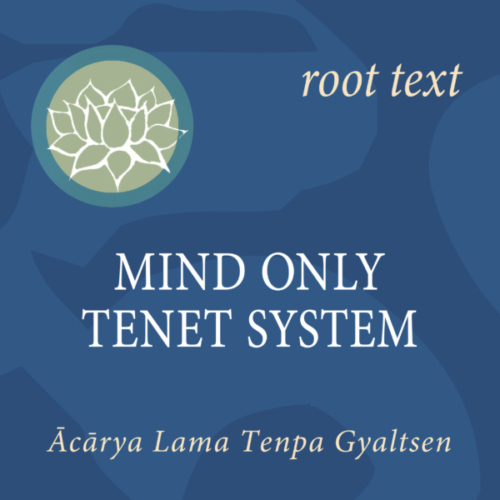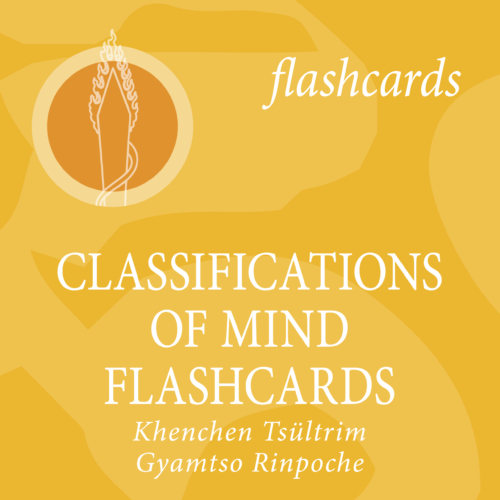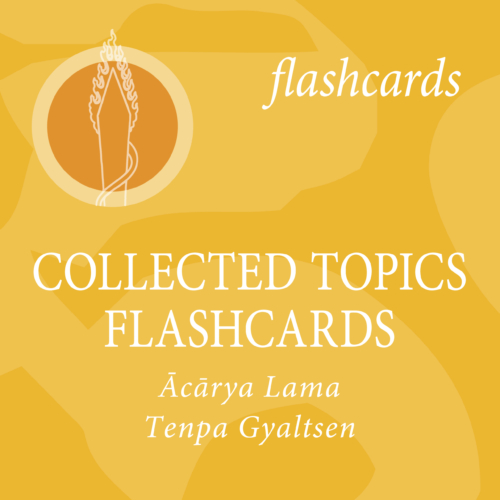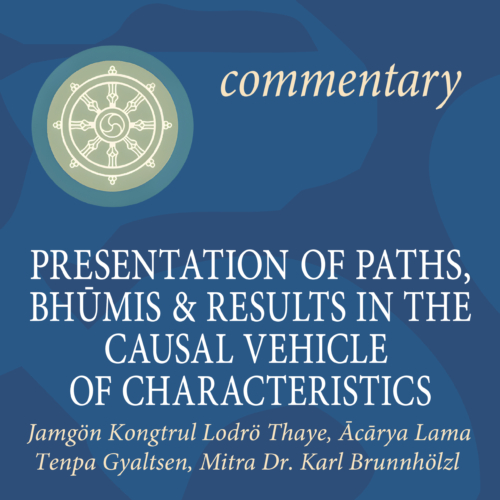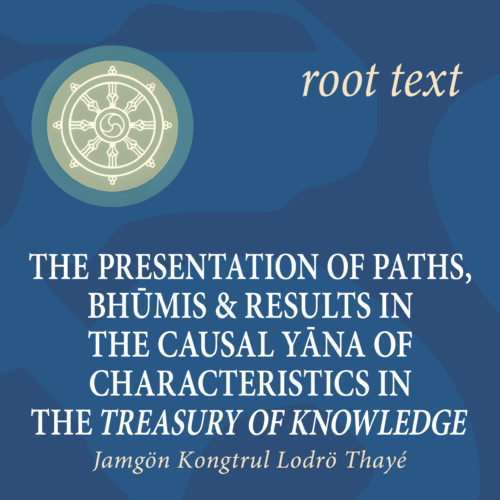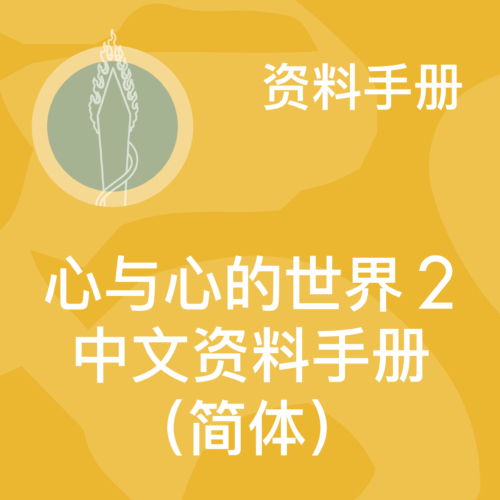-
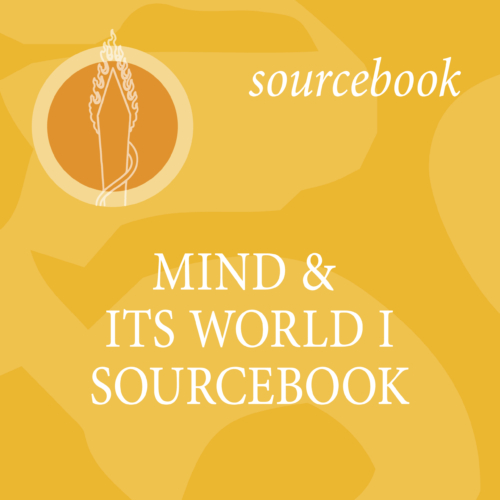 Also available as an eBook for Apple and Google. Mind and Its World I begins a detailed analysis of the subjective side of experience. It examines mind and how it perceives its world in valid and invalid ways based on the Classifications of Mind, which provides divisions and definitions of the types of mind identified in the epistemological tradition of Dignaga and Dharmakirti. The key point is the discernment of the aspects of mind that validly perceive things the way they are, which are distinguished from those aspects of mind that are mistaken and tainted by fundamental delusion, and thus keep one bound in samsara. It also introduces the two Hinayana philosophical systems, the Vaibhashika and Sautrantika schools, covering the two truths and the process of perception. Selected readings, analytical meditations, study questions, review summaries are included in the sourcebook.
Also available as an eBook for Apple and Google. Mind and Its World I begins a detailed analysis of the subjective side of experience. It examines mind and how it perceives its world in valid and invalid ways based on the Classifications of Mind, which provides divisions and definitions of the types of mind identified in the epistemological tradition of Dignaga and Dharmakirti. The key point is the discernment of the aspects of mind that validly perceive things the way they are, which are distinguished from those aspects of mind that are mistaken and tainted by fundamental delusion, and thus keep one bound in samsara. It also introduces the two Hinayana philosophical systems, the Vaibhashika and Sautrantika schools, covering the two truths and the process of perception. Selected readings, analytical meditations, study questions, review summaries are included in the sourcebook. -
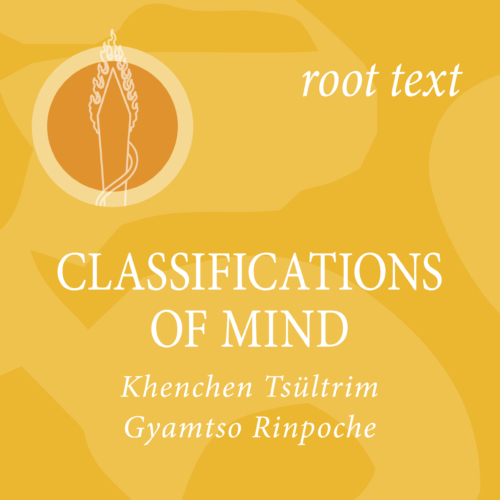
ROOT TEXT
Presentación de las Clasificaciones de la Mente: La Esencia del Océano de los Textos Sobre el Razonamiento por Khenchen Tsultrim Gyamtso Rinpoche. Este libro es un resumen conciso de la ‘ciencia de la mente’ budista que distingue los varios tipos de cognición válida directa e inferencial de la cognición no válida y enumera los diferentes eventos mentales. -
 (ESPAÑOL) Mind and Its World I begins a detailed analysis of the subjective side of experience. It examines mind and how it perceives its world in valid and invalid ways based on the Classifications of Mind, which provides divisions and definitions of the types of mind identified in the epistemological tradition of Dignaga and Dharmakirti. The key point is the discernment of the aspects of mind that validly perceive things the way they are, which are distinguished from those aspects of mind that are mistaken and tainted by fundamental delusion, and thus keep one bound in samsara. It also introduces the two Hinayana philosophical systems, the Vaibhashika and Sautrantika schools, covering the two truths and the process of perception. Selected readings, analytical meditations, study questions, review summaries are included in the sourcebook. Also available as an eBook for Apple or Android devices.
(ESPAÑOL) Mind and Its World I begins a detailed analysis of the subjective side of experience. It examines mind and how it perceives its world in valid and invalid ways based on the Classifications of Mind, which provides divisions and definitions of the types of mind identified in the epistemological tradition of Dignaga and Dharmakirti. The key point is the discernment of the aspects of mind that validly perceive things the way they are, which are distinguished from those aspects of mind that are mistaken and tainted by fundamental delusion, and thus keep one bound in samsara. It also introduces the two Hinayana philosophical systems, the Vaibhashika and Sautrantika schools, covering the two truths and the process of perception. Selected readings, analytical meditations, study questions, review summaries are included in the sourcebook. Also available as an eBook for Apple or Android devices. -
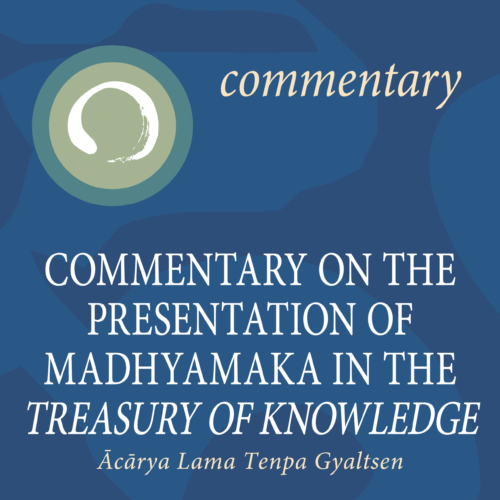
Author: Acharya Lama Tenpa Gyaltsen
A presentation of the philosophical tenets of the Madhyamaka tradition of the Mahayana. Based on sections of Jamgön Kongtrul’s Lodrö Thaye’s Treasury of Knowledge, this text focuses on the Madhyamaka presentation of the two truths, the views of the subschools of the tradition (Prasangika and Svatantrika), and the fundamental understanding of emptiness. Includes root text and commentary by Jamgön Kongtrul Lodrö Thaye, translated by Karl Brunnhölzl. -
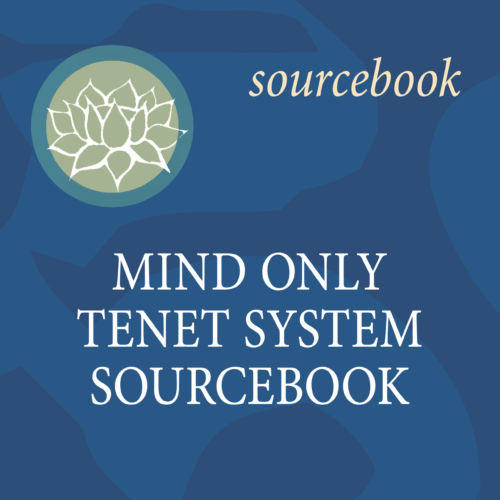 This sourcebook offers a systematic presentation of the Mind Only (Cittamātra) tenet system, one of the principal Mahāyāna philosophical schools. The Mind Only school emphasizes the doctrine that the subjective and objective poles of perception are not different in substance, but mental in nature. Specific topics include discussions on perception, the fundamental notion of “mind only,” the three natures, self-awareness, and the all-base consciousness. Also included is a brief discussion of the paths and the fruition. Selected readings, analytical meditations, study questions, and review charts are included in the sourcebook. Includes root text written by Acharya Lama Tenpa Gyaltsen.
This sourcebook offers a systematic presentation of the Mind Only (Cittamātra) tenet system, one of the principal Mahāyāna philosophical schools. The Mind Only school emphasizes the doctrine that the subjective and objective poles of perception are not different in substance, but mental in nature. Specific topics include discussions on perception, the fundamental notion of “mind only,” the three natures, self-awareness, and the all-base consciousness. Also included is a brief discussion of the paths and the fruition. Selected readings, analytical meditations, study questions, and review charts are included in the sourcebook. Includes root text written by Acharya Lama Tenpa Gyaltsen. -
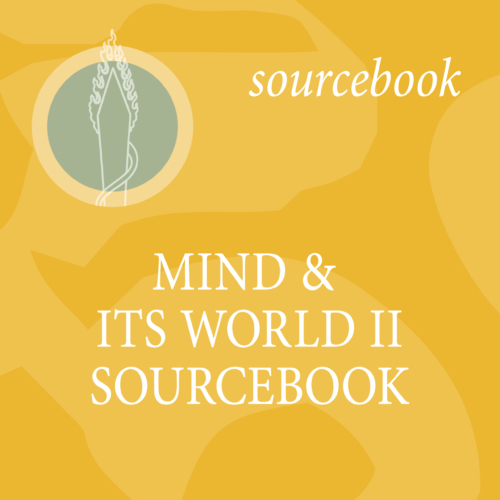 Also available as an eBook for Apple and Google. Mind and Its World II examines the theme of karma. It begins the study of causes and conditions as presented in Collected Topics, the twelve nidanas, or chain of interdependent origination, and the distinction between primary minds and mental factors. It includes a detailed presentation of the mental factors from the Classifications of Mind. Selected readings, analytical meditations, study questions, and review summaries are included in the sourcebook.
Also available as an eBook for Apple and Google. Mind and Its World II examines the theme of karma. It begins the study of causes and conditions as presented in Collected Topics, the twelve nidanas, or chain of interdependent origination, and the distinction between primary minds and mental factors. It includes a detailed presentation of the mental factors from the Classifications of Mind. Selected readings, analytical meditations, study questions, and review summaries are included in the sourcebook. -
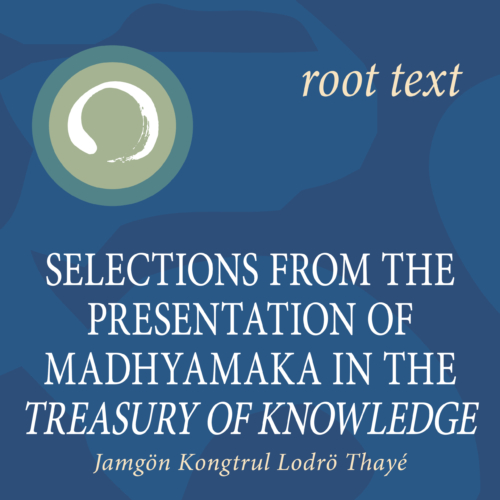
Author: Jamgön Kongtrul Lodrö Thayé Translator: Karl Brunnhölzl
A root text based on sections of Jamgön Kongtrul Lodrö Thaye’s Treasury of Knowledge. It systematically presents the Madhyamaka view of the two truths, the assertions of the subschools of the tradition, and formulates the emptiness reasonings. -
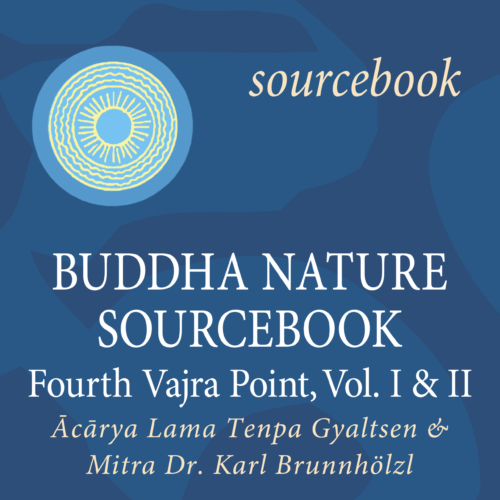
eBook available!
A Commentary by Acharya Lama Tenpa Gyaltsen and Karl Brunnhölzl
This is a newly updated sourcebook, a set of two volumes, produced from a series of talks given by Acharya Lama Tenpa Gyaltsen at Nītārtha Institute, Gampo Abbey, Cape Breton Island, Nova Scotia, Canada, in August and September 1998, and by a series of talks given by Karl Brunnhölzl at Nītārtha Institute, Nalanda West, Seattle, Washington, United States, September, October, and November 2018.
Available as eBook:
-
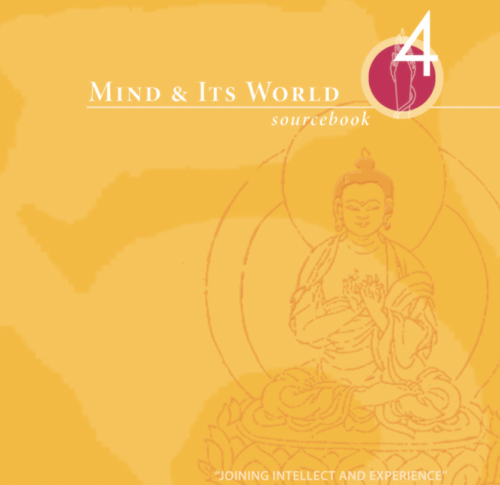
This is the updated Mind and Its World 4 Sourcebook for semester course and Summer Institute (not for Self-Paced Online Course).
Also available as an ebook for Apple and Google.The Mind and Its World 4 sourcebook presents the path and result of foundational Buddhism as found in the Vaibhāṣika and Sautrāntika philosophical traditions, based on The Gateway that Reveals the Philosophical Traditions to Fresh Minds root text. Talks by Dzogchen Ponlop Rinpoche, Acharya Kelsang Wangdi, Acharya Sherab Gyaltsen, and Professor Phil Stanley bring clarity to the subjects discussed in the root text. Key topics include the meaning of the path, the four applications of mindfulness, personal identitylessness, dependent origination, the four realities of the noble ones, the thirty-seven branches of enlightenment, and the results of the path. Numerous charts and diagrams are included as aids to understanding the material.
-
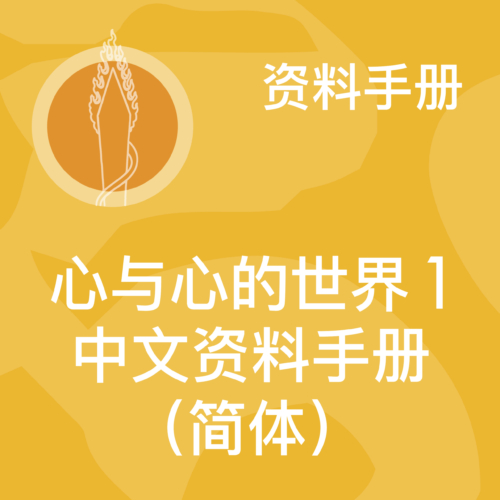 新版《心与心的世界1》和《心与心的世界2》对应英文版的两本同名手册,两本加起来是对堪布仁波切所著的原典《心的科学:逻辑海典心髓》的完整的释论。新版替代2021中文版的《心的科学:逻辑海典心髓释论》。新版按照英文版编排,并增加了阿阇黎谢拉布嘉诚的释论,和每课后的分析式禅修和闻思题。 《心与心的世界1》详细分析作为体验者的这个心,它如何以如实和不如实的方式感知世界,原典《心的科学:逻辑海典心髓》教导心的分类,法教源泉是陈那和法称的量论学传统。要点是区分哪些面向的心如实地感知现象本来的样子,哪些面向的心是错乱迷惑的,并束缚我们于轮回。手册还介绍了基础乘中有部和经部关于二谛和感知理论的宗义思想。每一课包括课外阅读、分析式禅修、闻思题。
新版《心与心的世界1》和《心与心的世界2》对应英文版的两本同名手册,两本加起来是对堪布仁波切所著的原典《心的科学:逻辑海典心髓》的完整的释论。新版替代2021中文版的《心的科学:逻辑海典心髓释论》。新版按照英文版编排,并增加了阿阇黎谢拉布嘉诚的释论,和每课后的分析式禅修和闻思题。 《心与心的世界1》详细分析作为体验者的这个心,它如何以如实和不如实的方式感知世界,原典《心的科学:逻辑海典心髓》教导心的分类,法教源泉是陈那和法称的量论学传统。要点是区分哪些面向的心如实地感知现象本来的样子,哪些面向的心是错乱迷惑的,并束缚我们于轮回。手册还介绍了基础乘中有部和经部关于二谛和感知理论的宗义思想。每一课包括课外阅读、分析式禅修、闻思题。 -
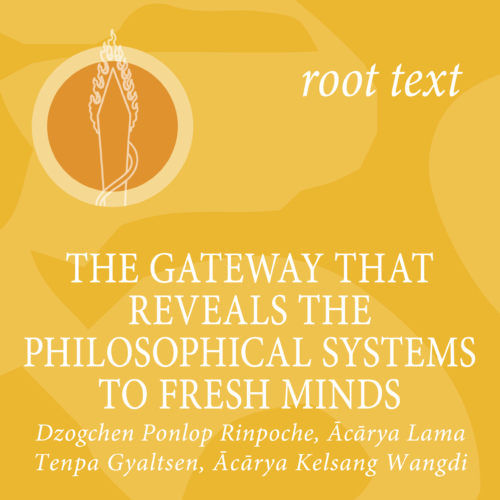 Updated Edition. Ebook available: for Apple and Google.
Updated Edition. Ebook available: for Apple and Google.Author: Dzogchen Ponlop Rinpoche, Acharya Lama Tenpa Gyaltsen, and Acharya Kelsang Wangdi Translator: Karl Brunnhölzl
A root text written by Dzogchen Ponlop Rinpoche, Acharya Lama Tenpa Gyaltsen, and Acharya Kelsang Wangdi. It presents the divisions and definitions of the Vaibhashika and Sautrantika philosophical systems.
-
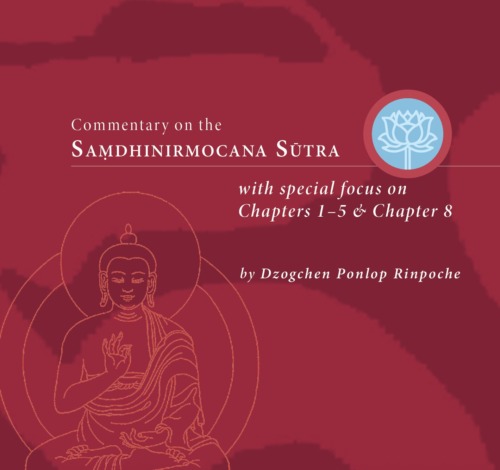 This expanded second edition features the profound oral commentary by Dzogchen Ponlop Rinpoche on the Saṃdhinirmocana Sūtra (Unraveling the Intent of the Buddha), a crucial sūtra for the Yogācāra tradition. This transcript now includes Rinpoche's teachings on the prologue, the first five chapters, which illuminate the five defining characteristics of ultimate reality and the presentation of the all-base consciousness, as well as Chapter Eight, which delves into the topic of meditation. Presented with remarkable clarity and detail, Rinpoche's commentary is accompanied by the oral translation of Mitra Tyler Dewar and the root text translation by Gregory Forgues. This edition is published with the generous patronage and supervision of 84000: Translating the Words of the Buddha, ensuring the accuracy and accessibility of this vital text.
This expanded second edition features the profound oral commentary by Dzogchen Ponlop Rinpoche on the Saṃdhinirmocana Sūtra (Unraveling the Intent of the Buddha), a crucial sūtra for the Yogācāra tradition. This transcript now includes Rinpoche's teachings on the prologue, the first five chapters, which illuminate the five defining characteristics of ultimate reality and the presentation of the all-base consciousness, as well as Chapter Eight, which delves into the topic of meditation. Presented with remarkable clarity and detail, Rinpoche's commentary is accompanied by the oral translation of Mitra Tyler Dewar and the root text translation by Gregory Forgues. This edition is published with the generous patronage and supervision of 84000: Translating the Words of the Buddha, ensuring the accuracy and accessibility of this vital text. -
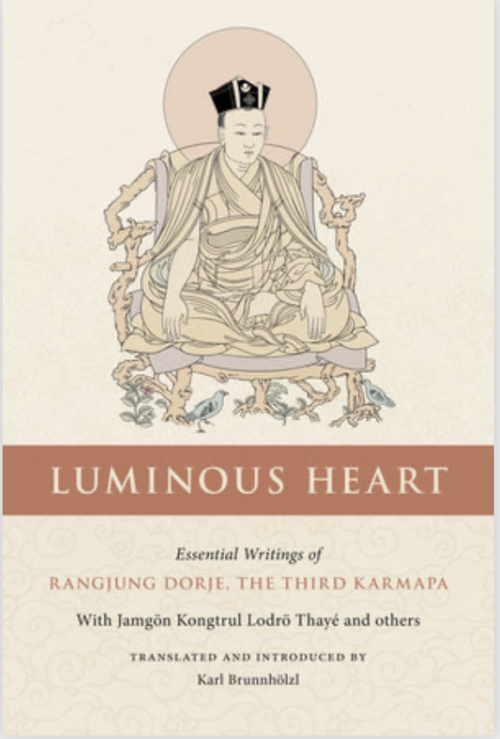
- Available as an eBook for Apple and Android devices.
- The hardcopy book is shipped from the US. International customers may wish to explore local booksellers, Shambala Publications, or Amazon to save on shipping cost.
Translator: Dr. Mitra Karl Brunnhölzl
An extraordinary collection of writings on buddha nature by the Third Karmapa Rangjung Dorje (1284-1339). The Third Karmapa Rangjung Dorje’s unique and balanced view synthesizes Yogācāra Madhyamaka and the classical teachings on buddha nature. His work focuses on the transition from ordinary deluded consciousness to enlightened wisdom, the characteristics of buddhahood, and a buddha’s enlightened activity. Included are commentaries by Jamgön Kongtrul Lodrö Tayé that supplement the view of the Third Karmapa on two fundamental treatises on buddha nature, emphasizing the luminous empty mind of buddha nature as presented by the great Indian masters Maitreya and Asaṅga. For those practicing the sutrayāna and the vajrayāna in the Kagyü tradition, what these texts describe can be transformed into living experience.
